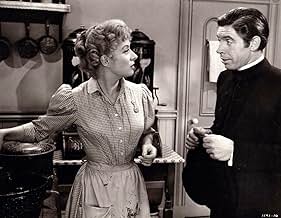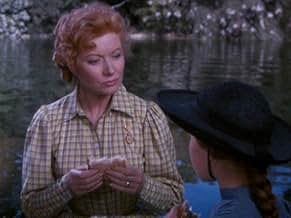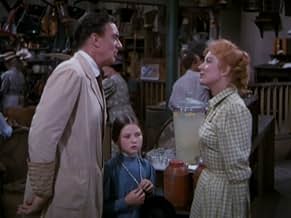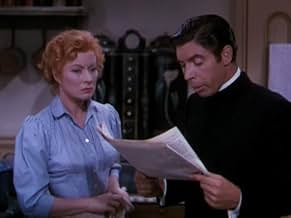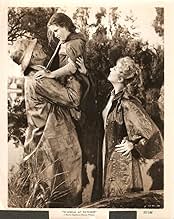After their orphanage burns down, a group of children are being transported west by train to Manitoba. All of them are available for adoption and at a stop at Scourie, Ontario little Patsy m... Read allAfter their orphanage burns down, a group of children are being transported west by train to Manitoba. All of them are available for adoption and at a stop at Scourie, Ontario little Patsy meets Victoria McChesney. Victoria and her husband Patrick have no children and she immedia... Read allAfter their orphanage burns down, a group of children are being transported west by train to Manitoba. All of them are available for adoption and at a stop at Scourie, Ontario little Patsy meets Victoria McChesney. Victoria and her husband Patrick have no children and she immediately decides to adopt the girl. The only condition imposed on them is that as Patsy has be... Read all
Featured reviews
This film deals with religious bigotry, and does so effectively. Both films demonstrate that when people take a respectful, but firm stand for something, they can achieve a worthy result. It is a moral picture as one has mentioned, and is well done. People have paid a price to effect vital change. That's a worthy theme.
I have wondered in each case, whether Greer Garson had an interest in the cause. She would have had more choices of films during these periods, I would think. In any event, as usual, she did a good job.
The only time I thought she was actually bad in something (a couple of her films themselves were weak) was in her depiction of Eleanor Roosevelt in "Sunrise at Campobello" with Ralph Bellamy as FDR. The accent and manner were pretty awful -- no, really awful.
But this is a good film. TCM shows it fairly regularly, as part of a Walter Pidgeon birthday salute or for Greer Garson, etc.
The two are childless and make a decision to adopt a little girl and you would think such matters would be divorced from politics on both sides of the 49th parallel. But little Donna Corcoran is a Catholic and the Garson and Pidgeon are Protestants. In fact Pidgeon is a deacon in their church. But they promise to continue raising her in the Catholic faith.
The orphanage where Corcoran came from was burned down and another kid adopted from the same orphanage starts spreading the rumor she did the deed. Pidgeon's bottom feeding opponent editor Philip Ober says that he only did this to curry favor with Catholic voters. And then some incidents happen and the film does make you wonder about whether Corcoran is a budding Patty McCormack.
The film's best asset is the matchless chemistry that Greer and Walter enjoyed on the screen. In a couple of years both would be gone from MGM as they and other big studios were getting shed of their big contract stars. Their scenes with each other and Greer's with Corcoran hold the film together.
What is really undefined and weakly resolved is the character of Tony Taylor who plays the other orphan. He confesses to at least one of the other bad acts and there's evidence that he could be a bad seed. But as this is a film aimed at family audiences that's all badly papered over by the script.
Scandal At Scourie does not come up to the standards of Mrs. Miniver or Madame Curie, that's Pidgeon and Garson at their best. But it still is a decent family film and today's audience would still enjoy this tale of turn of the last century Canada.
I haven't seen it since but I do remember that I was aware then that it was an example of Hollywood's backlot artistry, something which, were it to be remade today for TV, for example, might benefit from some location shooting in the actual locale of the story. It's a gentle film made with the care one would expect from the professionals listed in its credits, one of those relics unlikely to be made available on video, and that's really a loss that many of us do regret, however mildly. Turner Classic Movies unearths it from their treasure trove occasionally. Worth keeping an eye out for.
Did you know
- TriviaLast of eight movies that paired Greer Garson and Walter Pidgeon. The others are Les oubliés (1941), Madame Miniver (1942), Madame Curie (1943), Madame Parkington (1944), La belle imprudente (1948), La Dynastie des Forsyte (1949), and L'histoire des Miniver (1950).
- GoofsAt the beginning of the film it is obvious from the motion of the flames at the burned down orphanage that the shot is being run in reverse (or backwards).
- Quotes
Mrs. Victoria McChesney: [Mrs. McChesney is explaining to her adopted daughter why a little boy at school called her a bast - -] That word at school. It frightened you, didn't it? Do you know what it means?
[Patsy shakes her head]
Mrs. Victoria McChesney: And still it frightens you?
Patsy: I know it's bad.
Mrs. Victoria McChesney: Well, now, it's not really bad at all! Some people think it's bad just because they don't understand. You see, Patsy, what happened was that a lovely young girl met a handsome young man and they fell in love, but for some reason they couldn't get married. I don't know what the reason was, and it doesn't matter, but their sin is not yours, and they're paying for it terribly.
Patsy: How?
Mrs. Victoria McChesney: Because they haven't got you, sweetheart.
- SoundtracksGreen Sleeves
Traditional Air
- How long is Scandal at Scourie?Powered by Alexa
Details
- Release date
- Country of origin
- Languages
- Also known as
- Scandal at Scourie
- Filming locations
- Production company
- See more company credits at IMDbPro
Box office
- Budget
- $1,148,000 (estimated)
- Runtime
- 1h 30m(90 min)
- Aspect ratio
- 1.37 : 1


